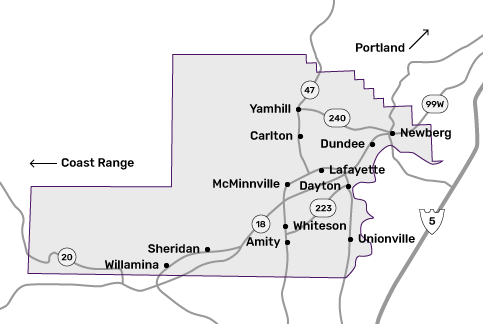Advocates Share Their “Why?”
Contributed by: Terri Phillips, Henderson House Board Member
At Henderson House, our advocates are often the first point of contact for women and men experiencing domestic violence and/or sexual abuse. They provide support to individuals struggling with feelings of shame, fear, and helplessness while taking their first step toward getting help. They remain a source of support throughout their clients’ journeys, from assisting with protection orders to attending court hearings and more. Advocates are the front line of Henderson House.
Below, we ask four Henderson House advocates to share why they became advocates, the most fulfilling and challenging aspects of their job, and what they wish more people would know. (Responses have been edited for brevity and clarity.)
What inspired you to become an advocate?
I had been working for a nonprofit community partner providing peer support and mental health services. When I decided to seek a new job position, I reflected on how many of my previous clients were experiencing domestic violence and sexual assault. Being a survivor myself, I had always wished I could do more for them regarding their trauma/abuse. ~Advocate A
I am a survivor. Once I started my education journey, I knew I wanted to help women and families in crisis due to violence. I had healed and was ready to help and give back. ~Advocate B
Unfortunately, a lifetime of abuse. It wasn’t until my late 30s that I realized I didn’t deserve it and did nothing to cause the abuse. This realization inspired me to work with others who’ve had the same experiences, so I can help remind them it’s not their fault and support them through their healing. ~Advocate C
Being a survivor, I’ve always wanted to give back to a cause that would inspire others to heal and become who they’ve always wanted to be if they hadn’t suffered from trauma. ~Advocate D
What do you feel is the most important part of your job?
The most important part of my job is simply showing up for whoever walks in the door or calls. I help alleviate the pressure and stress that comes with leaving an abusive situation by listening, empathizing, and providing options for support. I think what survivors need most is someone to help them process by listening to their story, so they know they have the strength to make the right choice for themselves. ~Advocate A
Being there for the survivors that come to us, providing the services they need, and supporting them through their healing journey. I also think being there for staff is an important part of my job. Providing leadership that supports them in the hard work that we do is important. ~Advocate B
Long term emotional support is one of the most important aspects of being an advocate. The trauma caused by domestic violence or sexual assault can ruin a person’s life if they’re not supported emotionally. Victims can have a hard time finding solace and make harmful choices to self-soothe. It’s my job to support them through the trauma and provide alternatives for healthy healing. ~Advocate C
Emotional support is one of the most important things a person can have when healing from trauma. With emotional support the victim can continuously be reminded that what they are experiencing is a normal response to trauma; eliminating their self-criticism and building on their strengths. ~Advocate D
What is the most challenging part of being an advocate?
Being a survivor myself, it can be very challenging to push through the sadness/trauma we hear all day in order to successfully provide services. However, it is very rewarding to feel connected to clients, advocate for them throughout their safety plan, and stand with them as they advocate for themselves. ~Advocate A
Not being able to provide support or services to a survivor in need. Sometimes a survivor isn’t safe enough or emotionally ready to receive support. Sometimes we can’t provide support due to a lack of funding, capacity, or services. Whatever the reason may be, it’s really challenging when we see a need but are unable to help. ~Advocate B
The most challenging part is learning how to protect your emotional health while supporting a victim, especially when their stories have similarities to your own. Vicarious trauma doesn’t have a flashing warning signal to let you know when it is happening, so we have to protect our emotional health while on the clock. That’s a true challenge. ~Advocate C
Vicarious trauma is a very real byproduct of advocating for victims of sexual violence, even more so when we identify with the victim. When our personal stories align with a victim’s, we need to make time for our own self-care so as to not cause more trauma for ourselves. I think the hardest part of the job is protecting ourselves while also supporting the victim in their time of need. ~Advocate D
What is the most fulfilling part of your job?
Seeing survivors regain their sense of self and start to find their own strength during their healing process. Being with survivors as they begin to understand the cycle of abuse is powerful. They regain their desire to love themselves, their children, and seek safety. ~Advocate A
The “success stories” are the most fulfilling part of being an advocate. When you see a single parent or family go from needing safety and support to a life free of violence, that is by far the best part of the work we do. When you hear that the family you worked with is safe and has stability once again, it is the best news. ~Advocate B
I think the most fulfilling part about being an advocate is helping an individual put the pieces of the broken puzzle back together and seeing the relief and hope on their faces again. Frequently victims come to us with only the clothes on their back. After assessing and providing for their needs, they begin to feel hope again. That’s powerful. ~Advocate C
Realizing that without my support the client wouldn’t have had enough courage to recover from their trauma. ~Advocate D
What is something you wish more people would know?
I wish our clients, community partners, and Henderson House supporters knew that individuals can call or walk in anytime, even if it’s simply for emotional support. I also want people to know that everyone may know someone who can benefit from your support or a referral to your local domestic violence agency. ~Advocate A
That it is hard work, and we hear a lot of really awful things, but it is also rewarding work. Once the survivor has found that safety and stability, it is the best feeling to know we helped make that happen. Offering someone a light to guide them through what may be the darkest time of their life is the greatest feeling. ~Advocate B
Abuse is never the victim’s fault. Nobody deserves to be hurt in a relationship, and nobody has the power to control you. ~Advocates C
Everyone knows someone who is experiencing domestic or sexual violence. We should all become aware of the signs to help protect everyone. ~Advocate D



